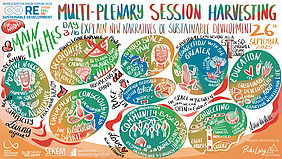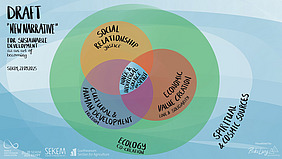Founded in 1977 in Egypt as a biodynamic farm, the Sekem initiative has evolved into an internationally recognised organisation that integrates agriculture, research (through the Heliopolis University for Sustainable Development), innovative economic models such as the Economy of Love, education, cultural and human development, and healthcare for more than 13 villages. In 2024, the initiative was honoured as a UN Champion of the Earth, and in 2003, it received the Right Livelihood Award (the "Alternative Nobel Prize").
Sekem thus provided the ideal setting to bring together over 150 international change-makers at the end of September to critically re-examine existing concepts and practices of sustainable development.
Scientific conference in preparation
Redefining sustainable development requires a holistic approach – and accordingly, this event was far more than a conventional conference. It represented a call for systemic and profound transformation. In the days leading up to it, the scientific conference "Sustainable Development for Global Impact" was held at the Heliopolis University for Sustainable Development. Over two days, more than 250 researchers and 50 representatives of various organisations from over 30 countries exchanged ideas and experiences to learn from one another.
Representing FiBL, Lin Bautze-Boeke participated in panel discussions and presented findings from several climate-related Horizon 2020 research projects, including ClieNFarms, Climate Farm Demo, and Organic Climate Net. Through encounters with policymakers, international organizations, and students, the event fostered international collaboration and laid the groundwork for future research initiatives within the framework of EU Horizon 2020 projects.
The scientific conference concluded with the words of Dr. Ahmed Elshazly, Vice President of Heliopolis University, who captured the spirit of the gathering: "Give young people a seat at the table. Show the world that sustainability is not a loss – it is a gain: in meaning, in quality of life, and in the joy of being connected with the Earth and with one another."
Developing a new narrative
With these words in mind, the main conference "Re-Think, Re-Feel, and Re-Do Sustainable Development" began. Here, the concepts and practices of sustainable development were collectively reflected upon and re-envisioned. The World Goetheanum Association, Sekem, and nine partner organisations – including the Club of Rome, the World Future Council, the Eosta & Robin Food Coalition, the World Ethic Forum, the Biodynamic Federation Demeter International, NaturaSi, the Egyptian Biodynamic Association, the Economy of Love Association, the Heliopolis University, and FiBL – joined forces to make this initiative a reality.
After four intensive days featuring keynote lectures, site visits to Sekem's facilities, group work, as well as artistic and practical exercises, a new narrative of sustainable development emerged. Artist Priska Lang visually captured this vision as a "graphic harvest."
This new narrative emphasises inner development as a central element of further progress. It places social relationships, cultural and human development, and economic value creation at the core. Most importantly, it calls for a redefinition of our relationship with the environment — in which nature is not merely one of three pillars, but the foundation and boundary of all future human action.
Whether and how this new definition will prove effective in practice will now be explored at personal, project-based, and national levels. Further ideas and contributions are warmly welcomed (contact: Lin Bautze-Boeke). The first results of its implementation will be published as soon as they become available.
Further information
Contact
Link
worldgoetheanumforum.org: Conference Website




![[Translate to English:] Group photo with around 100 people from different cultures.](/fileadmin/_processed_/3/a/csm_WGF_gruppenbild_samuel_knaus_d907966f20.jpeg)

